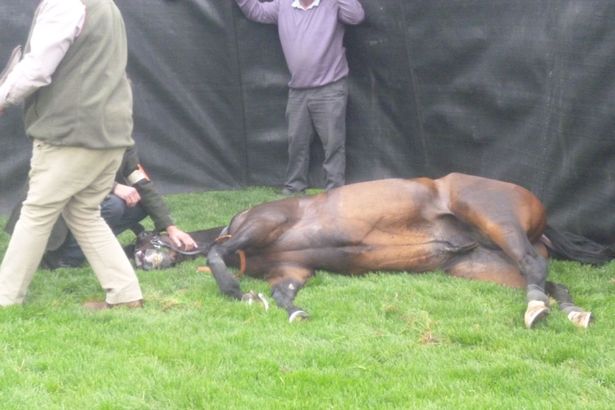
[Download]
Kyle talks to Sofia Smallstorm about the history of humans with horses, how they allowed for civilization to spread and flourish, and the many ways they have been used, such as in racing. This brings them to the topic of increased numbers of expensive racehorses getting injured (and then killed), which is likely due to the food that they are eating, which is laden with glyphosate,
Restore clinical trial re: glyphosate
Share this show!


Know nothing about horses, but couldn’t pass this one up. This horse is trying to cover himself up with a blanket!
“There’s something about the way that a horse looks on the outside that makes a man feel good on the inside.” I’ve always liked that quote but can’t remember where it came from. I rode horses when I was young.
So, is this known poisoning of valuable horses being kept secret because they don’t want people making the link to the human consumption of glyphosate in our food? There may well be an insurance scam angle to this as well. Feeding “normal” food would never be proved to cause fractures, and they collect winnings and compensation. When i was watching those cattle and horse mutilation docs on YT, one expert was theorizing that these animals were being used to harvest experimental viruses, like HIV. Do the (((gov’t))) then use DEW technology to extract blood and soft tissues with non-human precision, and blame it on ufo’s and little green men? PS More fascinating info from Sofia, so thanks Kyle for this interesting show. Also, happy birthday… Read more »
Excellent show with a unique topic; Sofia is always a great guest.
There are some good sources of glycine from veggies, fruit, nuts, seeds and grains:
soybeans, spinach, kale, cauliflower, cabbage, pumpkin, banana, kiwi fruit, cucumber, fonio, watercress, sesame seeds, pumpkin seeds, beans, pistachios, sunflower seeds, mustard seeds, purslane, lentils, carrots, beets, eggplant, barley, rye, rice, potato, sweet potato, pears, apples, hazelnuts, walnuts, almonds.
The grain fonio has almost all of the amino acids considered to be essential. It makes a great base for a rice bowl style meal, with stir fried veggies or with a stew poured over.
Thank you for some good information on this toxic world and its effect on our beautiful horses. However… Here are some things I heard said about the race horses and some of my reactions. “this unbelievable performance at the Kentucky Derby” Glad you were impressed. For me, all I see is exploitation and torture. We’re told Sham banged his head, had two teeth knocked out, still, he raced, almost won but for a few inches, which says he worked so very hard under duress. He should not have been made to race with an injury. We were told there are health steps to be taken for the horse to “preserve its earning potential,” for, after all, the horse is “an investment.” This, after it was… Read more »
it also depends on the breed of horse, the faster and more agile ones are stand a higher chance of being injured. Compare those to more sturdy horses that were used in farming, war (more like pulling supplies and artillery pieces than light cavalry) and other physically demanding tasks.
I noticed you recently subscribed to Vegan Gains: http://prntscr.com/n8k9gf
Vegan Gains’ Top 10 death threats & violent outbursts: https://youtu.be/OR9jIVKSJ4k?t=48
He also has a white girl friend who could be a transvestite: http://prntscr.com/n8kfm4
He also has been hating on John Rose for being an “anti-semite”.
Despite his empty threats, he certainly makes a good point surrounding the human killing and mistreatment of animals. It would be interesting if Vegan Gains were to someday criticize Kosher and Kapparot, along with Halal and whatever the Muslim equivalent of animal sacrifice. The inevitably of animal fatalities on farms outside of the area of the meat industry would also be an interesting topic for VG to discuss, from combating rodent infestation to those same mice being killed by farm machinery, to pesticides and road kill.